SOCIALIZING YOUR PUPPY ESPECIALLY DURING THR CORONAVIRUS
The upside to staying at home is that it is a great time to raise a puppy! They keep us company, give us something to do and bring such joy and comfort to our lives.
We are expecting three litters this next month and the puppies future families might be questioning how to socialize a new puppy when we are “socially distancing” ourselves.
Before your puppy goes home here are the things your puppy will experience the first 8-9 weeks:
Birth to 2 weeks: We introduce NEONATAL SOCIAL IMPRINTING (this is a Berkshire Hills created series of gentle imprinting before the puppies eyes and ears are opened.) These exercises boosts the dog-human bond.
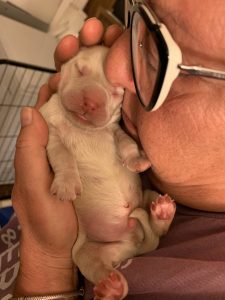
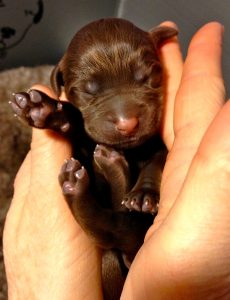
2 weeks to 4 weeks: Eyes and ears have opened. Puppies are gently introduced to age appropriate environments, foods, toys and family members. Their pen has expanded and set up with a potty area and play area. They have begun to walk and play with each other, and learning social cues from their litter mates and mama.
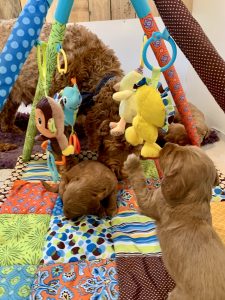
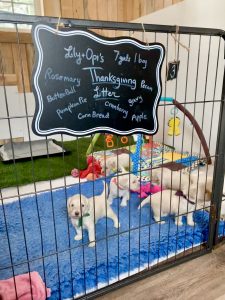
4 weeks until they go home:
Puppies are now in their regular pen with potty station, toys and crates. They get to play in the large playroom daily. In the playroom they have tunnels, swings, teeter boards, objects to climb and chase each other around and new surfaces like metal grates and foam pillows.
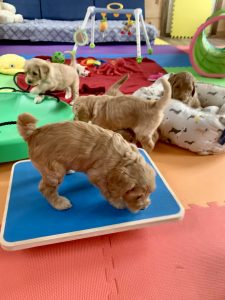
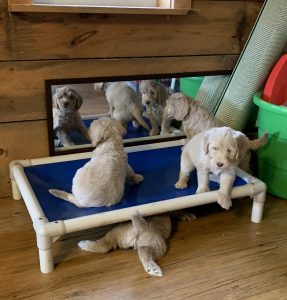
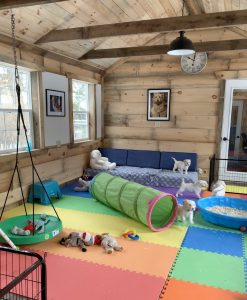
We have a variety of music and sounds that we play. And have a tv in the larger playroom to help the puppies get used to a variety of sounds they will encounter in the outside world.
The puppies also have several outdoor playgrounds to explore with larger tunnels, outdoor toys and slides, grass turf and stone pathways.
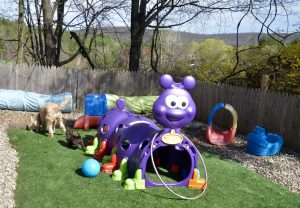
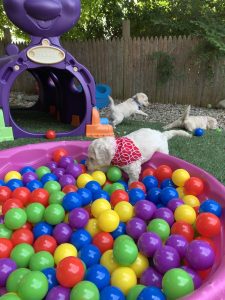
Our other adult dogs come in to play with the puppies. They teach the pups boundaries and dog language. This sets the puppies up for learning cues and boundaries from other dogs they will encounter later in life.
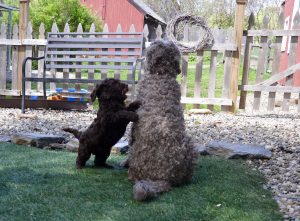
We normally have our Puppy Buddies come and help socialize our puppies and we will continue to have a few people in our inner circle until it safe to open up to more people. We surprise the puppies by wearing funny hats and outfits and talking in odd voices and we also practice exercises to get them used to sudden movement and hands coming at them and over their heads.
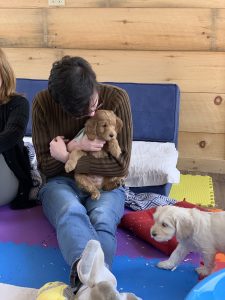
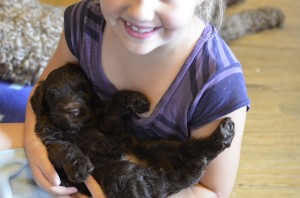
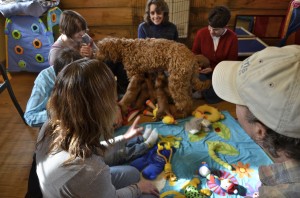
When the puppies are closer to going home they will have been in the car several times. Taken for walks in the stroller to get used to the sound of cars, trash pick up, and other sounds not familiar near the puppy house. We will also take adventure walks up on our hill and paths. If the weather is nice enough we will set up kiddie pools and introduce them to water.
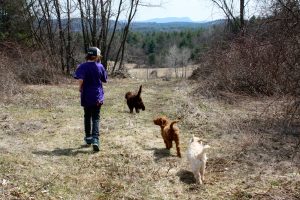
So your puppy will go home pretty well socialized! Once your puppy goes home here are some excellent suggestions from AVID DOG.
- Focus on building your pup’s trust in you and your family. The most important lesson for pups to learn in these early months is to trust people, especially their people. During this time, focus on building that trust through teaching communication, cues, house manners, tricks, and fitness exercises. Practice these things in each room in your house and every part of your yard. Your pup’s trust in you, above all else, will enable you to pick up his socialization again once this is over.
- Go all chameleon. If your pup can’t meet folks who look different, then change the way you look! Use masks, wigs, hats, umbrellas, cloaks, and more. Have your family play along! Pop up looking like Halloween throughout your house and property, not in a scary way but in a surprising way. Try manipulating your smell, too. You can’t actually change your odor, which is very important to dogs, but you can spritz yourself with some light scent to add to the way you smell.
- Set up challenging, stimulating experiences at home. Puppy brains and bodies need to be challenged during these months, so think of ways to do this at home. Create obstacle courses in your house or yard. Play scent games, hiding treats for your pup to sniff out around the house and yard. (Just remember not to violate house rules during this game, so no treats on counters.) Let your pup solve all kinds of problems (e.g., how to find you in the house and to solve dog puzzles.)
- Do Adventure Walks! We may not be able to gather in groups but we can head out into the great outdoors. Make an effort to get your pup to woods, meadows, fields, beaches, and even parks. Adventure Walks enable pups to learn responsibility and problem-solving as well as develop their brain-body connection. And best of all, Adventure Walks tire pups out! We are recording an Adventure Walk webinar this week, so we’ll send out a note when it’s done.
- Introduce your puppy to as many safe people as possible. Most likely there will still be some safe people in your life. They might be family members, neighbors, or tenants who are staying put at home. Let your pup interact with as many people as you safely can.
- Let pups see people, places, and things! Even if you can’t introduce your pup directly to new people, your pup can still be introduced to the world. These indirect interactions, where pups see and hear but don’t touch are very important for teaching puppies proper manners. Think through what you want your pup to do when it can see another person or dog but can’t approach. Then teach that behavior to your puppy.Take short trips to let your pup see and hear whatever is happening. No doubt, life is going to be quieter for a while so this may take some effort. Look for garbage trucks, traffic, fire departments, and anything else noisy and hang out with your pup.
- Get your pup off your property. Pups become location sensitive towards the end of this period, attaching them strongly to their homes and yards. Since we want our pups to be comfortable in many places, we need to get them away from the house. Drive your pup to different places in your area where people aren’t congregating. Playgrounds, parks, outdoor shopping malls, and store parking lots. Take your pup for a ride in a wiped-down shopping cart. Let her jump up on park benches. Invesitigate the playground equipment.
- Emphasize handling, grooming, and examinations at home.Most likely your pup will be doing fewer visits to the vet and groomer during the pandemic, so you have to take responsibility for teaching your pup to tolerate handling, touching, and manipulation.
|
|
|















